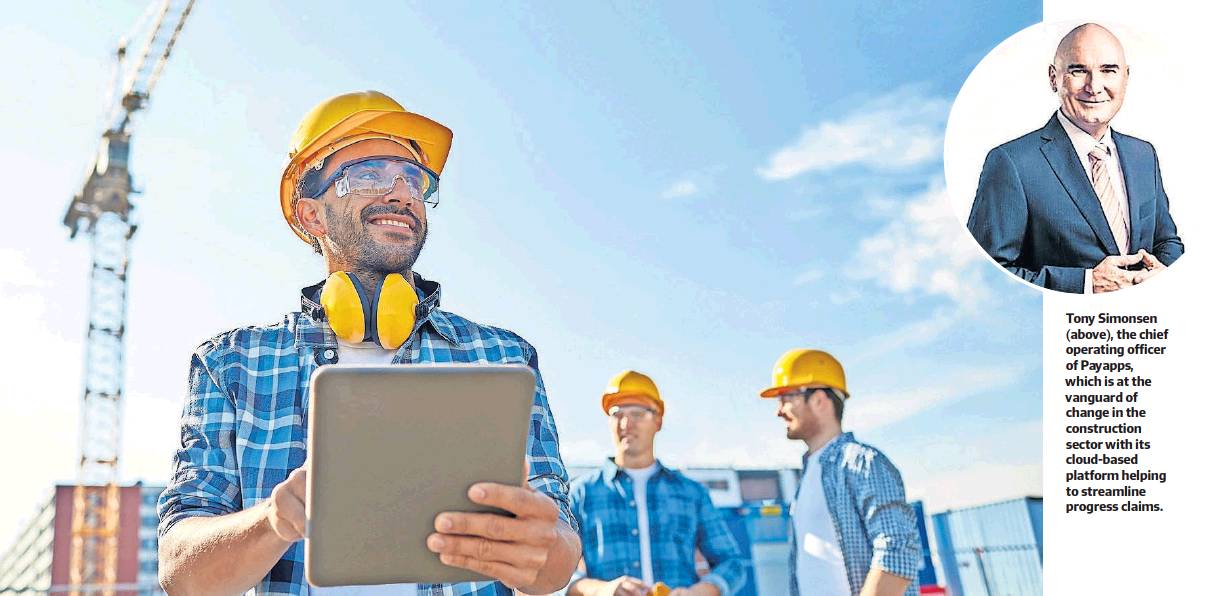Construction sector is ripe for transformation
The notion of the devil being in the detail could not be more apt for the construction sector, which relies on a coherent flow of paperwork to ensure the smooth completion of any given project.
When it comes to payments, the sector is well known for delays due to inefficient and cumbersome manual processes – even if the payments themselves are largely electronic.
In the case of progress claims, the seemingly simple process is often plagued by lost or errorprone paperwork, or simply poor collaboration between parties. These crucial claims are also often submitted via email or even snail mail, without any audit trail or substantiation process.
These shortcomings highlight the broader issue of the construction sector’s relatively slow adoption of technology, in both the back office and the ‘‘coal face’’ of the building site.
One reason is that the $US1 trillion sector – one of the world’s biggest economic drivers – is populated in part by firms which haven’t yet adopted a ‘‘digital-first mentality” and are often run by founders who are less focused on the operational side of the business.
But times are changing as a more tech-savvy generation enters the industry and demands access to the tools that make these tasks more efficient and which free up staff for value-adding activities.
“As an industry, digital transformation and adoption has not been as quick as we would all like to see,” says Tony Simonsen, the chief operating officer of software company Payapps. “But the construction workplace of the future is certainly going to be very different to how it’s been historically.”
The Melbourne-based Payapps is leading this tide of change via its cloud-based platform to streamline progress claims. The technology solves many challenges and facilitates much stronger collaboration between subcontractor and builder.
The platform ensures accuracy and consistency when submitting relevant information. It also enables a transparent and accurate payment claim process for all parties, ultimately reducing the time to payment.
“There are also broader compliance issues to be addressed, such as subcontractor declarations and insurances,” Simonsen says. “Once again, certificates and other documents can be stored within the platform so that any builder knows their subcontractor has the right to be working on a job site and have paid their own subcontractors.”
Payapps’ clients are both builders and subcontractors. “Typically, a builder subscribes and asks the subcontractor to work on the platform for a specific project,” Simonsen says.
“More and more, we’re working directly with subcontractors who use the platform to manage their claims processing, including working with builders who aren’t on the platform yet.”
In short, Payapps’ ethos is about making the payments process simpler and more efficient, but also fair and compliant. For instance, customers can ensure they adhere to the various state-based ‘‘security of payment’’ laws that protect subcontractors from payment disputes.
“The chances of a dispute are minimised as progress is managed in a very visible way,’’ Simonsen says. ‘‘Both parties are working from the same set of numbers. Cash flow is very important for subcontractors. They know that once they submit a claim and the assessment begins, the clock will start ticking around payment time frames.
“For the builder, there’s improved visibility across the approval process and additional value by being able to integrate the platform into other enterprise resourcing platforms (ERPs) to manage other aspects of the project.”
As with so many other industries, COVID-19 compelled the construction sector to work differently. During the first wave of the pandemic, the sector was able to operate with minimum disruption, thanks to strict on-site protocols.
But operational staff retreated to working remotely – and by and large they discovered they were just as effective as before. Ironically, the isolation also improved communication between the various parties.
“For those companies already embracing digital solutions, COVID-19 actually lifted the intensity of communication and collaboration,” Simonsen says. “The industry was a shining light through the pandemic, quite frankly.”
First launched in Australia in 2015, Payapps has amassed a list of clients including some of Australasia’s biggest builders: names such as Built, Probuild, ADCO Constructions, ICON Co, Lend Lease and John Holland.
Payapps’ parent company, Zuuse, has around 80 employees and 22,000 customers in construction and building management operations, spanning Australia and New Zealand, the UK and Ireland, and North America.
Zuuse’s strong prospects have been validated by IFM Investors, which invests on behalf of Australia’s burgeoning industry funds sector.
In its first foray, IFM Investors’ new private equity fund is taking an equity stake in Zuuse worth approximately $50 million. Investing alongside IFM is Leigh Jasper, co-founder of the home-grown construction software house Aconex (acquired by Oracle Corporation in 2017).
“Digital claims management solutions bring enormous efficiency to the construction industry,” says Jasper, who recently became a Zuuse non-executive director alongside IFM’s Adrian Kerley and Jeremy Larkin.
“The market is in the early stages of adoption and I am confident that the team will be able to move rapidly to take advantage of this white space opportunity globally.”
The funding injection will fuel Payapps’ expansion offshore, notably in the under-serviced New Zealand market.
“IFM has seen the potential for us, not just in Australia and New Zealand but worldwide,” Simonsen says.
“The investment also validates a returning confidence in the global construction sector.”
